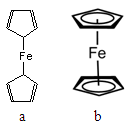铁及其化合物在生产、生活中存在广泛用途,完成下列填空。
(1)如图所示为铁元素在周期表中的信息,方格中“55.85”的意义为: 。铁原子核外有 种运动状态不同的电子。

(2)二茂铁[Fe(C5H5)2]是一种有机金属化合物,熔点172℃,沸点249℃,易升华,难溶于水易溶于有机溶剂。二茂铁属于 晶体;测定表明二茂铁中所有氢原子的化学环境都相同,则二茂铁的结构应为图中的 (选填“a”或“b”)。

(3)绿矾(FeSO4·7H2O)可用于治疗缺铁性贫血,其水溶液露置于空气中会变质,
写出发生变质反应的离子方程式 。
(4)无水FeCl3是水处理剂,遇潮湿空气即产生白雾,易吸收空气中的水分成为结晶氯化铁(FeCl3·6H2O)。制备无水FeCl3的试剂是 。
(5)高铁酸盐也是常用的水处理剂。高铁酸钠(Na2FeO4)可用如下反应制备:
2FeSO4 + 6Na2O2 → 2Na2FeO4 + 2Na2O + 2Na2SO4 + O2↑,若生成2mol Na2FeO4,则反应中电子转移的物质的量为 mol。
(6)高铁酸盐可将水体中的Mn2+氧化为MnO2进行除去,若氧化含 Mn2+ 1mg的水体样本,需要1.2 mg/L高铁酸钾 L。
(1)铁元素的相对原子量(或铁元素的原子量)(1分) 26种(1分)
(2)分子晶体(1分) b(1分)
(3)12Fe2++ 6H2O + 3O2 → 8 Fe3++ 4Fe(OH)3(2分)
(4)铁和氯气(2分)
(5)10mol(2分)
(6)2 L (2分)
题目分析:(1)55.85表示铁元素的相对原子量(或铁元素的原子量);铁元素核外电子数是26,所以铁原子核外有26种运动状态不同的电子。
(2)二茂铁[Fe(C5H5)2]是一种有机金属化合物,熔点172℃,沸点249℃,易升华,难溶于水易溶于有机溶剂,这说明二茂铁属于分子晶体;由于二茂铁中所有氢原子的化学环境都相同,这说明分子的结构对称,因此二茂铁的结构应为右图中的b。
(3)亚铁离子具有还原性易被氧化,所以发生变质反应的离子方程式为12Fe2++ 6H2O + 3O2 → 8 Fe3++ 4Fe(OH)3。
(4)FeCl3遇潮湿空气即产生白雾,易吸收空气中的水分成为结晶氯化铁(FeCl3·6H2O),因此一般不通过复分解反应制备氯化铁,所以制备无水FeCl3的试剂是铁和氯气。
(5)根据反应式可知,反应中铁元素的化合价从+2价升高到+6计算,失去4个电子。另外过氧化钠中氧元素的化合价从-1价升高到0价,失去1个电子,则生成1mol氧气转移2mol电子,所以若生成2mol Na2FeO4,则反应中电子转移的物质的量为2mol×4+2mol=10mol。
(6)反应中锰元素的化合价从+2价升高到+4价,失去2个电子。而铁元素的化合价从+6价降低到+3价,所以根据电子得失守恒可知,若氧化含 Mn2+ 1mg的水体样本,设需要1.2 mg/L高铁酸钾溶液的体积为V,则 ×3=
×3= ×2,解得V=2L。
×2,解得V=2L。
